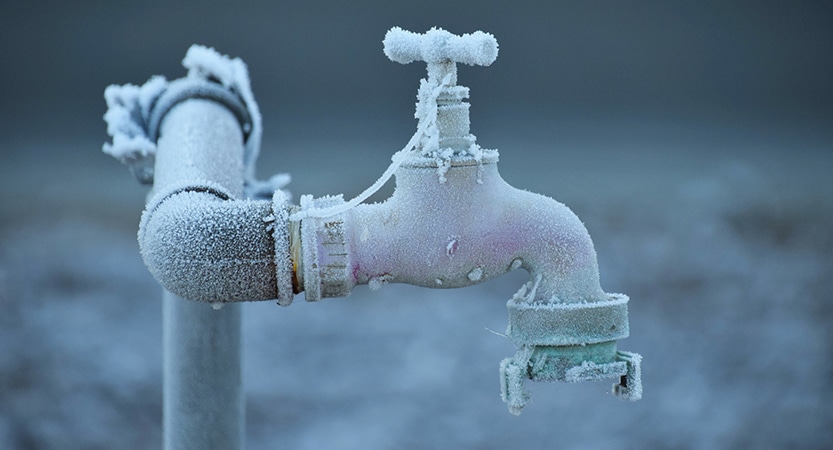Tips for Avoiding Frozen Plumbing in Winter: Professional Advice
Tips for Avoiding Frozen Plumbing in Winter: Professional Advice
Blog Article
This article down below in relation to Preventing and dealing with frozen pipes is unquestionably fascinating. Give it a try and make your own personal findings.
:strip_icc()/snow-outdoor-faucet-pipes-4af65d1e5e904fb1aa7bf74071fe5d89.jpg)
Cold weather can wreak havoc on your plumbing, especially by freezing pipes. Below's exactly how to stop it from taking place and what to do if it does.
Introduction
As temperatures decline, the threat of frozen pipelines boosts, potentially causing expensive repair services and water damages. Comprehending just how to prevent frozen pipelines is critical for property owners in cold climates.
Comprehending Frozen Pipes
What triggers pipelines to ice up?
Pipes freeze when subjected to temperature levels below 32 ° F (0 ° C) for extended periods. As water inside the pipes freezes, it broadens, taxing the pipeline walls and possibly triggering them to break.
Dangers and problems
Icy pipelines can lead to supply of water interruptions, home damage, and costly repair services. Ruptured pipelines can flooding homes and create substantial architectural damages.
Signs of Frozen Water Lines
Identifying icy pipes early can stop them from bursting.
How to determine frozen pipelines
Try to find decreased water circulation from taps, uncommon odors or noises from pipelines, and visible frost on subjected pipes.
Avoidance Tips
Insulating prone pipes
Cover pipes in insulation sleeves or utilize warmth tape to safeguard them from freezing temperatures. Focus on pipelines in unheated or external locations of the home.
Home heating techniques
Maintain indoor areas appropriately heated up, particularly areas with pipes. Open cabinet doors to enable cozy air to flow around pipes under sinks.
Protecting Exterior Pipes
Yard hose pipes and outside taps
Disconnect and drain pipes yard tubes prior to winter season. Set up frost-proof spigots or cover outdoor taps with shielded caps.
What to Do If Your Pipes Freeze
Immediate actions to take
If you believe icy pipelines, maintain taps open to relieve stress as the ice melts. Utilize a hairdryer or towels taken in hot water to thaw pipelines gradually.
Long-Term Solutions
Structural modifications
Consider rerouting pipelines far from outside walls or unheated locations. Add extra insulation to attics, cellars, and crawl spaces.
Updating insulation
Invest in top notch insulation for pipelines, attics, and walls. Correct insulation helps keep regular temperature levels and minimizes the danger of frozen pipelines.
Final thought
Avoiding icy pipelines needs aggressive steps and quick reactions. By understanding the causes, indicators, and preventive measures, homeowners can protect their plumbing throughout winter.
Helpful Tips to Prevent Frozen Pipes this Winter
UNDERSTANDING THE BASICS: WHY PIPES FREEZE AND WHY IT’S A PROBLEM
Water freezing inside pipes is common during the winter months, but understanding why pipes freeze, and the potential problems it can cause is crucial in preventing such incidents. This section will delve into the basics of why pipes freeze and the associated problems that may arise.
THE SCIENCE BEHIND FROZEN PIPES
When water reaches freezing temperatures, it undergoes a physical transformation and solidifies into ice. This expansion of water as it freezes is the primary reason pipes can burst. As the water inside the pipe freezes, it expands, creating immense pressure on the walls. If the pressure becomes too great, the pipe can crack or rupture, leading to leaks and water damage.
FACTORS THAT CONTRIBUTE TO PIPE FREEZING
Low Temperatures: Extremely cold weather, especially below freezing, increases the risk of pipes freezing. Uninsulated or Poorly Insulated Pipes: Pipes located in unheated areas, such as basements, crawl spaces, or attics, are more prone to freezing. Insufficient insulation or lack of insulation altogether exacerbates the problem. Exterior Wall Exposure: Pipes running along exterior walls are susceptible to freezing as they encounter colder temperatures outside. Lack of Heating or Temperature Regulation: Inadequate heating or inconsistent temperature control in your home can contribute to frozen pipes. PROBLEMS CAUSED BY FROZEN PIPES
- Pipe Bursting: As mentioned earlier, the expansion of water as it freezes can cause pipes to burst, resulting in significant water damage.
- Water Damage: When pipes burst, it can lead to flooding and water damage to your property, including walls, ceilings, flooring, and personal belongings.
- Structural Damage: Prolonged exposure to water from burst pipes can compromise the structural integrity of your home, leading to costly repairs.
- Mold and Mildew Growth: Excess moisture from water damage can create a favorable environment for mold and mildew growth, posing health risks to occupants.
- Disrupted Water Supply: Frozen pipes can also result in a complete or partial loss of water supply until the issue is resolved.
WHY CERTAIN PIPES ARE MORE PRONE TO FREEZING
- Location: Pipes located in unheated or poorly insulated areas, such as basements, crawl spaces, attics, or exterior walls, are at higher risk of freezing.
- Exterior Pipes: Outdoor pipes, such as those used for irrigation or exposed plumbing, are particularly vulnerable to freezing as they are directly exposed to the elements.
- Supply Lines: Pipes that carry water from the main water supply into your home, including the main water line, are critical to protect as freezing in these lines can affect your entire plumbing system.
- Underground Pipes: Pipes buried underground, such as those connected to sprinkler systems or outdoor faucets, can be susceptible to freezing if not properly insulated.
https://busybusy.com/blog/helpful-tips-to-prevent-frozen-pipes-this-winter/

I ran across that write up about 6 Ways to Prevent Frozen Pipes when perusing the web. Those who appreciated our blog post please do not forget to pass it around. I value reading our article about Preventing and dealing with frozen pipes.
Visit Our Site Report this page